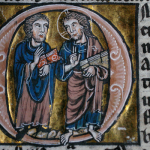Last updated on: January 25, 2017 at 9:58 pm
By
CNA Daily News
Lima, Peru, Jan 25, 2017 / 02:58 pm (CNA/EWTN News).- The Sodalitium Christianae Vitae announced Saturday that 66 persons can be considered victims of abuse of mistreatment by members of the community. The superior general of the community, Alessandro Moroni Llabres, also said Jan. 21 that the society has set aside more than $2.8 million in reparations and assistance for victims.Moroni's statement followed the Jan. 16 decision of Peruvian public prosecutor María del Pilar Peralta Ramírez to drop charges against the founder, Luis Fernando Figari, and other members of the community. Figari has been accused of sexual abuse, mistreatment, and abuse of power. There was a protest, which included some of the complainants, outside one of the society's pastoral centers in Lima, rejecting the decision of the attorney general's office. The Sodalitium Christianae Vitae is a society of apostolic life which was founded in 1971 in Peru, and granted pontifical recognition in 1997. CNA's executive director, Alejandro Bermúdez, and its director of operations, Ryan Thomas, are both members of the community. Cardinal Joseph Tobin of Newark was in May 2016 appointed as the Vatican's delegate to oversee ongoing reform of the society. The cardinal had previously served as superior general of the Redemptorists, and secretary of the Congregation for Institutes of Consecrated Life and Societies of Apostolic Life. Moroni began his statement saying that he was delivering it so as “to make known the details of the reparations which we have already granted because of the moral responsibility we have before the persons who have suffered because of some members and ex-members of our organization.” He pointed out that “when we received the prosecutor's ruling to dismiss the complaint, we understood that it is a decision based on the strict framework of criminal law.” “I would like to remind you that this investigation did not have as its goal to prove whether there were or were not victims of wrongdoing by persons connected to our community, but rather to prove if we are a criminal enterprise, which has committed kidnapping and serious injuries. The ruling has dismissed that accusation. That is why we are in agreement with it,” he said. However, he recalled that “besides the norms proper to the judicial and canonical spheres, there is a necessary moral sphere.” In that respect he reiterated the community's pronouncements recognizing “all the harm done” by Figari and “condemning his actions and declaring him a persona non grata.” “We have also asked for [Figari's] removal from our community and we have sent all the information on his case to the Holy See,” he added. Moroni said that “unfortunately, there's not much more we can do in this regard. Figari's trial is proceeding in Rome and we can only wait for the final pronouncement by the Vatican authorities.” “On the other hand, we have also recognized that some members of our community have done much harm and we have taken very concrete measures to clarify the truth about all these cases,” he stated. “And this is most important thing: we are maintaining our commitment to making redress to those who suffered because of this. Those persons continue to be our priority.” He recalled that an Ethics Commission for Justice and Reconciliation was formed in November 2015 at the request of the Sodalitium Christianae Vitae so that the victims “could be welcomed and served in the first instance by highly respected and objective persons.” In April 2016, that commission's report detailed an internal culture of extreme “discipline and obedience to the founder” which was “forged on the basis of extreme physical demands, as well as physical punishments, constituting abuses which violated the fundamental rights of persons.” Moroni said the ethics commission presented 32 cases to the Sodalits, and that another team of international experts in abuse investigations and the care of victims found another 71, “and we have attended to a total of 103 persons.” “Of this total, sufficient elements have been found to consider 66 persons as victims of abuse or mistreatment of a different nature.” “To determine if a person can be considered a victim,” he said, “we did not require any technical or scientific means of proof, such as would be required in any juridical investigation. Rather, we made a moral evaluation, considering the verisimilitude of the testimonies that were received. And in case of doubt, we have opted to trust the persons who have given us their testimony.” He indicated that in 47 cases an agreement for monetary compensation was reached. Of these, 35 have been completed already, while the other 12 are still being taken care of. Five of the victims are in waiting, “because they are part of the judicial process.” Another three “have rejected our proposal and one does not want to continue with the process. There are in addition 10 persons in the process of receiving a final proposal for reparation.” “Among monetary compensations, medical or psychological assistance, help to return to the workforce, and support for some persons whose cases did not correspond to this process, but who had urgent needs, the amount approved for this purpose so far totals more than $2,842,000,” or 9.36 million Peruvian soles. Moroni continued: “For us, the principal responsibility does not fall upon the Vatican or the Peruvian Church. Nor does the principal responsibility fall on the Attorney General's Office; the principal responsibility of seeking the truth and repairing the damage is OURS.” “Beyond the lofty complexity of the judicial and canonical processes, today we want to reaffirm that we are determined to fulfil our moral responsibility, with all its consequences,” he stated. Moroni reiterated the community asks forgiveness from “everyone who has suffered any kind of abuse or mistreatment on the part of a member or ex-member of the Sodality, and also from all of society, which has been understandably indignant.” “To the members of our spiritual family and the people of good will who work daily in our apostolates,” he continued, “we ask forgiveness for all of the continued suffering in this painful process. We encourage you to continue trusting in the action of God, who by his infinite mercy brings forth fruits of conversion, solidarity, and reconciliation among us.” “Welcoming the truth, however painful it may be, and making reparation to those who have suffered, we will be able to go forward on the path of service to which God calls us,” Moroni concluded. In addition to Peru, the community operates in Argentina, Brazil, Colombia, Costa Rica, Chile, Ecuador, the United States, and Italy. Read more
















